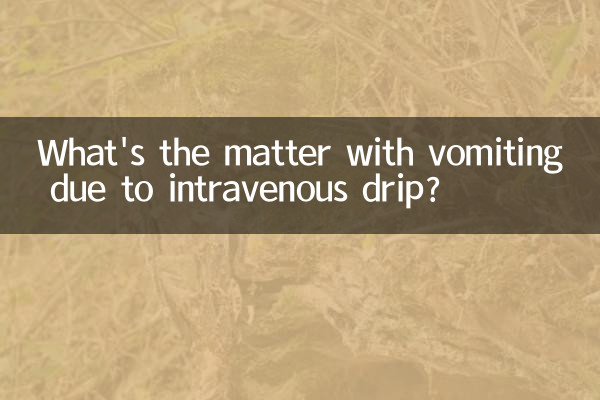What's the matter with vomiting due to intravenous drip?
Recently, the topic of "vomiting due to intravenous drip" has sparked widespread discussion on social media and medical forums. Many patients reported nausea, vomiting and other symptoms during or after the infusion. What is going on? This article will analyze the possible causes from a medical perspective and provide you with a reference based on hot data from the entire network in the past 10 days.
1. Data on hot medical topics across the Internet in the past 10 days

| Ranking | keywords | search volume | Main discussion platform |
|---|---|---|---|
| 1 | Side effects of intravenous drip | 285,000 | Weibo/Zhihu |
| 2 | Causes of vomiting due to infusion | 192,000 | Baidu knows |
| 3 | drug allergy symptoms | 157,000 | Douyin/Kuaishou |
| 4 | Precautions for intravenous infusion | 123,000 | little red book |
2. Common causes of vomiting due to intravenous drip
1.drug reaction: Some drugs (such as antibiotics, chemotherapy drugs, etc.) may stimulate the gastrointestinal tract and cause vomiting. According to statistics, about 15%-30% of infusion patients will experience mild gastrointestinal reactions.
2.Dripping too fast: When the infusion rate exceeds the body's ability to bear it (especially in those with poor heart function), it may cause nausea and vomiting. The ideal dripping rate should be controlled at 40-60 drops/minute.
| patient type | Recommended drip speed | risk threshold |
|---|---|---|
| average adult | 40-60 drops/minute | >80 drops/minute |
| elderly | 30-50 drops/minute | >60 drops/minute |
| child | 20-40 drops/minute | >50 drops/minute |
3.electrolyte imbalance: Large infusion of glucose or normal saline may cause electrolyte imbalance, and changes in blood sodium concentration exceeding 10% may cause vomiting.
4.allergic reaction: In addition to rash, drug allergy may also manifest as gastrointestinal symptoms. You need to be alert to severe allergic reactions such as dyspnea and drop in blood pressure that may occur at the same time.
3. Discussion of recent typical cases
A case shared by a tertiary hospital showed that a 23-year-old woman vomited after infusion due to gastroenteritis, which was found to be caused by too fast a drip rate (up to 90 drops/minute). The symptoms disappeared after adjusting to 45 drops/minute. Doctor reminds:
• Medical staff should be informed of past drug allergies before infusion
• If you feel unwell, call the nurse immediately for adjustment.
• Do not adjust the drip rate yourself
4. Professional doctor’s advice
Director Wang of Peking Union Medical College Hospital emphasized in a recent health live broadcast:
"Clinically, about 20% of infusion reactions manifest as gastrointestinal symptoms. Patients are advised to:
1. Eat a moderate amount before infusion (avoid fasting or overfullness)
2. Adopt a semi-recumbent position
3. Prepare lemon slices and smell them to relieve nausea.”
5. Emergency treatment plan
| Symptom level | Performance | Treatment measures |
|---|---|---|
| Mild | Simply disgusting | Slow down the drip rate and observe |
| Moderate | Vomiting 1-2 times | Stop infusion and report to doctor |
| Severe | Persistent vomiting with other symptoms | Stop the infusion immediately and provide first aid |
According to the latest medical data, more than 90% of infusion-related vomiting symptoms can be relieved within 30 minutes after timely intervention. However, if it is accompanied by changes in consciousness, rash, or difficulty breathing, allergy emergency procedures need to be initiated immediately.
6. Preventive measures
1. Choose a regular medical institution for infusion treatment
2. Read the drug instructions carefully before infusion
3. Prepare a vomit bag and change of clothes
4. It is recommended that someone accompany you during infusion
The "Intravenous Drug Safety Guidelines (2023 Edition)" recently issued by the National Health Commission specifically emphasizes that medical institutions should establish a standardized response process for adverse infusion reactions, and patients also have the right to ask medical staff to explain the risks of medication.
If you have an infusion plan in the near future, it is recommended to save the precautions mentioned in this article. If persistent vomiting or other discomfort occurs, please keep the batch number of the infusion drug and seek medical examination in time.

check the details

check the details